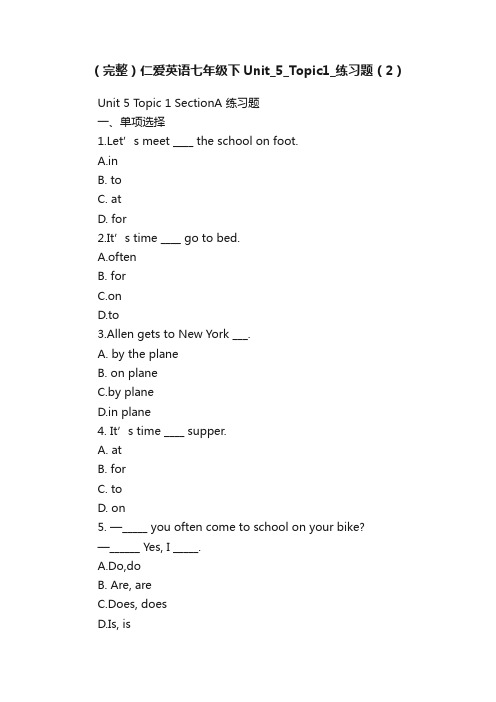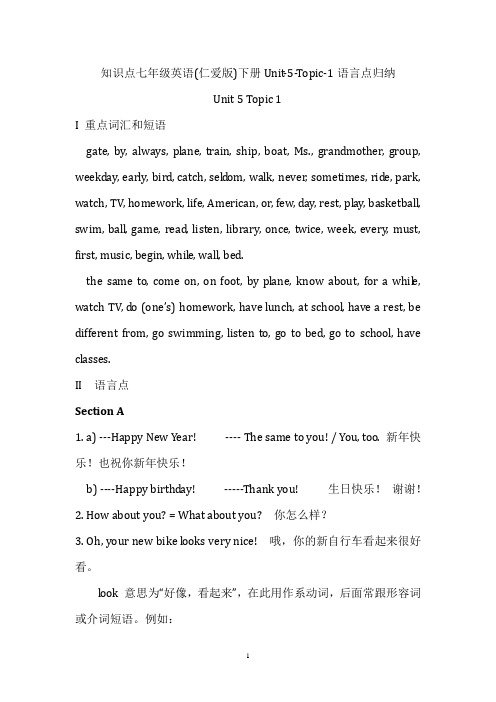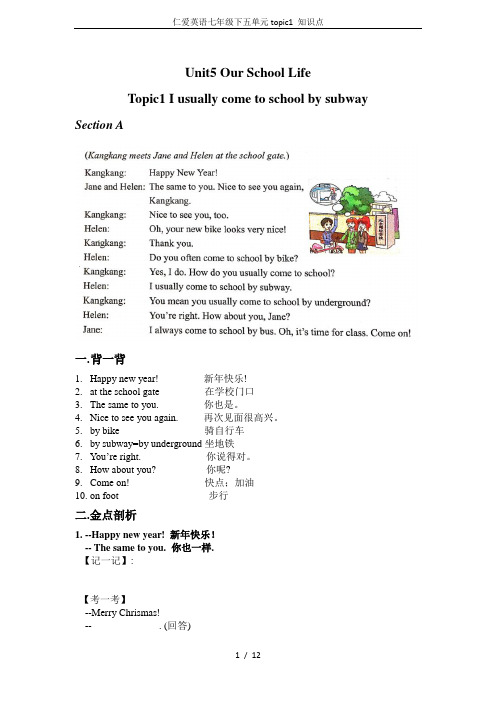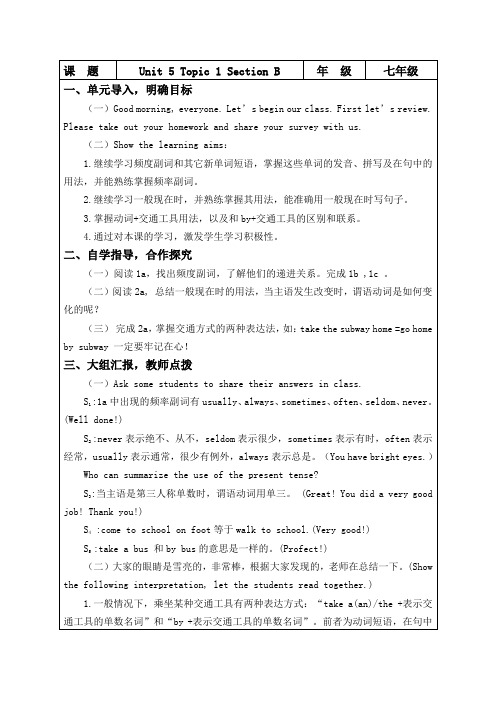最新科普(仁爱)版英语七年级下册Unit5 Topic1 Section D【问题训练评价单】【含答案】
(完整)仁爱英语七年级下Unit_5_Topic1_练习题(2)

(完整)仁爱英语七年级下Unit_5_Topic1_练习题(2)Unit 5 Topic 1 SectionA 练习题一、单项选择1.Let’s meet ____ the school on foot.A.inB. toC. atD. for2.It’s time ____ go to bed.A.oftenB. forC.onD.to3.Allen gets to New York ___.A. by the planeB. on planeC.by planeD.in plane4. It’s time ____ supper.A. atB. forC. toD. on5. —_____ you often come to school on your bike?—______ Yes, I _____.A.Do,doB. Are, areC.Does, doesD.Is, is6.—How do you usually come to school? —I usually come to school ____ foot.A.InB. byC. withD.on7. She looks_____. Ask her to help you.A. oldB. sorryC.wellD. kind8.—____ do you usually go to school? —By bike.A.WhatB.WhenC.HowD.Which9.—Happy New Year!—________ !A.Thank youB. Not at allC. The same to youD.You are welcome10. My bool is interesting._____ yours?A.What isB.Whose isC.How aboutD.What is like二、句型转换1. Tom usually drives to work. (变同义句)Tom usually _____ _____ ______ ______ ______.2. 我们中有五人骑自行车上学。
仁爱版英语七年级下册Unit5_Topic1_SectionD教案

Unit5 Topic1 SectionD精品教案I. Material analysis本节课是第五单元话题一的最后一个课时,主要活动是Grammar,Functions 和2。
本课通过听力填空、采访问答等活动引导学生总结频度副词结合一般现在时实意动词的用法、以及新年问候、对频率提问和回答等相关表达法。
此外,本课还将通过对Michael有关校园生活的采访了解中西方中学生的日常活动的异同,培养学生的文化意识。
最后通过Project活动调查同学的校园生活,对比中美两国中学生的校园生活,进一步巩固本单元所学日常活动的重要词汇、交通形式和频率的表达,训练学生的语言实际运用能力。
在本课中,教师应避免让学生机械记忆,而是通过引导学生自行总结,在理解中熟练应用并掌握所学语法和功能。
II. Teaching aims1.Knowledge aims能根据已学语音、音标及发音规则,正确朗读和拼写下列词汇:great, wall, the Great Wall, life, American, or, over, more, talk总结频度副词结合一般现在时实意动词的用法;能结合话题,运用“谈论日常活动、了解学校生活”等交际功能意义的表达,进行对话操练并加以总结;复习含有新年问候、交通方式的表达。
2.Skill aims能听懂有关表达交通方式和频度的简单对话和叙述;能听懂简单的课堂用语,并作出反应;能在教师的指导下参与角色扮演活动;能在口头表达中做到发音清晰,注意重音和升降调;能根据图文理解相关话题,抓住大意和具体信息,并根据要求进行学习活动;能准确写出黑体单词和词组;能写出表达交通方式和频度的简单句子;能写出叙述学校生活的篇章。
3.Emotional aims在学习过程中,结合小组竞赛、同伴互助等活动,培养互相帮助、共同进步的合作精神;采用角色扮演等灵活多样的学习方式,激发学习英语的兴趣;通过了解他人的校园生活培养关心他人的意识。
仁爱版七年级下册英语Unit 5 Topic 1---3同步知识点汇总

知识点七年级英语(仁爱版)下册Unit-5-Topic-1语言点归纳Unit 5 Topic 1I 重点词汇和短语gate, by, always, plane, train, ship, boat, Ms., grandmother, group, weekday, early, bird, catch, seldom, walk, never, sometimes, ride, park, watch, TV, homework, life, American, or, few, day, rest, play, basketball, swim, ball, game, read, listen, library, once, twice, week, every, must, first, music, begin, while, wall, bed.the same to, come on, on foot, by plane, know about, for a while, watch TV, do (one’s) homework, have lunch, at school, have a rest, be different from, go swimming, listen to, go to bed, go to school, have classes.II 语言点Section A1. a) ---Happy New Year! ---- The same to you! / You, too. 新年快乐!也祝你新年快乐!b) ----Happy birthday! -----Thank you! 生日快乐!谢谢!2. How about you? = What about you? 你怎么样?3. Oh, your new bike looks very nice! 哦,你的新自行车看起来很好看。
仁爱版七年级英语下册unit5 topic1教材讲解

Unit 5 Our School Lifetopic1 How do you go to school?一. 重难点讲解1.the same to you = you too 也祝福你……(用于公共节日,假日等别人向你祝福时回应对方)Happy New Year!/ Merry Christmas!--The same to you./You to.2.look(1)v.+ n /名词性词组看 eg:Look at the breaball.Eg:Look,there are some boys playing in the ground(2)系动词+形容词看起来…… eg:She looks very nice.3. I usually go to school by bike.---How do you usually go to school? (how询问别人的交通方式)How does your mother go to work?---She goes to work by bike.(1)by+交通工具构成介词短语--by air=by play =on a play--by sea = by ship/boat = on a ship/boat--by subway = on a subway--by bus = on a bus--by car = in a carIn/on + a/an/the/one’s + 交通工具--on foot 步行4.It’s time for sth/doing sth是做某事的时候了to do sthIt’s time for breakfast. = It’s time to have breakfast = It’s time for having breakfast.It’s time for sb to do sth 到某人该做某事的时候了It’s time for sb to have lunch.5.频率副词:never 决不, seldom 很少, sometimes有时候, often 常常, usually 通常, always 总是。
仁爱英语七年级下五单元topic1 知识点

Unit5 Our School LifeTopic1 I usually come to school by subway Section A一.背一背1.Happy new year! 新年快乐!2.at the school gate 在学校门口3.The same to you. 你也是。
4.Nice to see you again. 再次见面很高兴。
5.by bike 骑自行车6.by subway=by underground坐地铁7.You’re right. 你说得对。
8.How about you? 你呢?e on! 快点;加油10.on foot 步行二.金点剖析1. --Happy new year! 新年快乐!-- The same to you. 你也一样.【记一记】:【考一考】--Merry Chrismas!-- _____________. (回答)2. Oh, your new bike looks very nice! 你的新车看起来很漂亮!【记一记】:拓展:look ____ 看look ____ 看上去像look ____ 照看【考一考】1. Ann’s mother is not at home. So Ann has to _________ her sister.2.Jim _______ his father. They both(都) have small eyes.3. Please _______ the photo! It’s wonderful.4. Your dress _____ very nice. May I have a look?A. watchB.seesC. looksD. shows3.--How do you usually come to school? 你平时怎么去上学?-- I usually come to school by subway.【记一记】:注意:① by,on, in 引导的短语在句中只能作状语,与go,come,get等连用。
仁爱科普版英语七年级下册Unit 5 Our school life Topic 1 Section

作谓语;后者为介词短语,在句中常做状语。
如:I usually take a bus to work.=I usually go to work by bus.(注意:home为副词,因此home前介词to要省略。
)2.频度副词是指一类表示动作发生次数的副词,常见有never,seldom,sometimes,often,usually,always等。
频度副词通常位于行为动词前,be动词、助动词、情态动词后。
如:He seldom comes to see us.Miss Wang is always busy.I don’t often go to the park on weekdays.She can never understand that.四、巩固练习,拓展提高(一)Listen to 3 and check (Ⅴ) the correct answers.(二)Chant and then match the first four sentences with the pictures. Finish 3.(三)Do some practices.1.I often go home on foot(写出同义句)I often_______ __________.2.He always takes the bus to school.(写出同义句)He always_____ _____ _______ _______ _______.3.His father usually go to work by car.(写出同义句)His father usually ________ ________ work.五、课堂小结,单元回归1.交通方式的表达:ride a(an)/the... /take a(an)/the...+表示交通工具的单数名词2. 频度副词:always,usually,often,sometimes,seldom,never附:作P lease write a short passage according to Section B,3。
仁爱版英语七年级下册Unit5Topic1知识点

Unit 5 Topic 1重点语法一般现在时(常与频度副词never, seldom, sometimes, often, usually, always等连用)重点句型—How do you usually come to school?—I usually come to school by subway.—How often do you go to the library?—Once/Twice/Three times a week/Very often/Every day/Seldom 重点详解1. I always come to school by bus.by+交通工具名称,表示使用某种交通方式,中间不加限定词,如果交通工具前有a, the, my 等限定词,就不能用by,而是用in或是on.on the train=by train on his bike=by bike in my car=by car.巧辩异同on foot 与walk: on foot “走路”,是介词短语,不能作谓语,只作方式状语,位于句末。
walk “走路”,是动词,可以作谓语。
go to…on foot= walk to例:I often go to school on foot. =I often walk to school.同样,go to….by bike = ride a bike togo to…. by car = drive a car togo to … by plane = fly togo to… by bus = t ake a bus to2 .Come on! It’s time for class. come on “快点,加油,来吧”。
It’s time for sth. “该做某事了”,与It’s time to do sth.意思一样。
3 .look (感官动词) 看起来,后面加形容词例:They look very cute.look的短语look the same看起来一样look like看起来像……look for寻找look after 照顾4. do my homework at school 在学校做作业do one’s homework 做家庭作业(注意:one’s 要随主语的变化而变化,常用形容词性物主代词my, your, their, our, his, her等)。
新仁爱科普版七年级英语下册Unit 5 Topic 1 Section D 课件

Functions
Happy New Year! Happy New Year! /The same to you. The early bird catches the worm.
She goarter to ten.
How often do you come to the library?
2. often 意为“经常”,在频度上不如 usually那么频繁。 Li Ping often does his homework in the afternoon. 李平经常在下午做作业。 never 从未;永不;决不。 I have never been there. 我从未到过那里。
- 1、下载文档前请自行甄别文档内容的完整性,平台不提供额外的编辑、内容补充、找答案等附加服务。
- 2、"仅部分预览"的文档,不可在线预览部分如存在完整性等问题,可反馈申请退款(可完整预览的文档不适用该条件!)。
- 3、如文档侵犯您的权益,请联系客服反馈,我们会尽快为您处理(人工客服工作时间:9:00-18:30)。
最新科普(仁爱)版英语七年级下册Unit5 topic1 Section D【问题训练评价单】【含答案】班级:学生:分数:
一、词汇。
根据所给单词适当形式填空。
1.Your new watch __looks ____ (look) very nice!
2.Here _is___ (be) some news新闻.
3.Oh, come on! It’s time__to___go to school.
4.They usually go to school on __foot______(feet).
5.In my class, forty of __us_____(we) go to school by bike.
6.The early bird __catches____ (catch) the worm.
7.Kangkang often __rides___ (ride) a bike to the park.
8.What time __is___ (be)school over?
9.Work must come __first____(once).
10.It’s time _for___you to get up.
11.We often __read___ books in the morning.
12. Jill’s friend s like _studying ____(study) in our school.
13. Mr. Wang teaches __us____(we) English. __All ___ of us like him.
14. How about __going____(go) out with me?
15. Most students go to school ___by _ the school bus.
二、选择题。
1.______ do you go shopping with your mother?
A. How soon
B. How far
C. How often
D. How much
2. What time do you usually get up _____ weekdays?
A. at
B. in
C. on
D. by
3. He ______ busy, so he has no time to play with us.
A. is always
B. seldom is
C. always is
D. often is
4. He often ______ a school bus on weekdays.。
